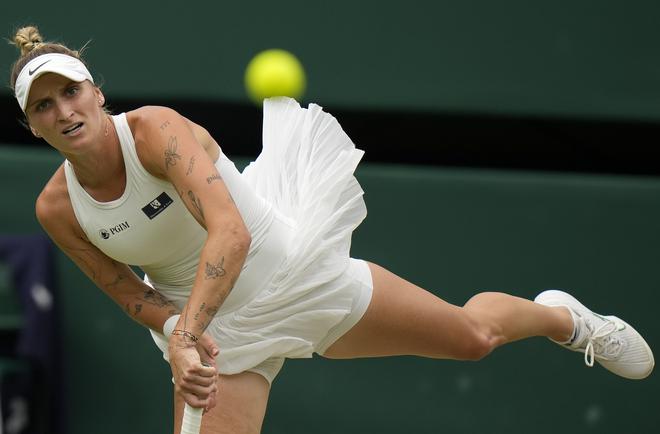“On grass, I didn’t play well before. I think it was the most impossible Grand Slam for me to win. When we came, I was just like, ‘Try to win a couple of matches’. Now this happened, it’s crazy”, said Marketa Vondrousova with Wimbledon’s Venus Rosewater Dish in her hands on Saturday, July 14, 2023. It was curious that the former junior number 1, winner of the WTA 250 while ranked 233, and a Tokyo Olympics silver medallist arrived in the final with a questionable level of self-assurance.
In the first set and leading five games to four, Vondrousova had not only endured an early break of serve but also the Centre Court’s cacophony that was defiantly backing world number 6 Ons Jabeur from Tunisia. Vondrousova was, on paper in-form, having beaten world number 3 Elina Svitolina and world number 4 Jessica Pegula en route to the finals. At this point in time, the commentator observed, “What a turnaround we have here”. But it was hardly the biggest turnaround the unseeded Czech had achieved in her career.
An iterative development
In 2022 around this time, Vondrosouva was in the Wimbledon stands, with her left arm in a cast. She was healing a second wrist surgery and rooting for her friend and doubles partner, Miriam Kolodziejova. Marketa Vondrousova had been sidelined from professional tennis for six months, from April to October.
A closer look into her career shows her tendency to relinquish matches from strong positions.

Marketa Vondrousova, like many athletes, grew up with sports in her DNA. Her father, David Vondrous, who played tennis for pleasure, encouraged her to take up the sport at the age of 4. Her mother, Jindriska Anderlova, was a professional volleyball player for SK Slavia Prague in the top-tier volleyball league Czech Extraliga. After dabbling in many other sports, Marketa focused on tennis from the age of 6. When she entered the ITF Junior Circuit at the age of 13, she had already won the Nike Junior Tour International Masters in the U.S. and some praise for competing with older athletes. From there on, she established herself more as a doubles player, often partnering with compatriot Miriam Kolodziejova with whom in 2015, she won the 2015 Australian Open girl’s double title. She claimed the world number 1 ranking in the junior circuit after winning the Grade-A ITF Grande Milan title in the singles and doubles format.
In 2019, she reached the French Open finals but failed to live up to the billing as a worthy opponent in the final, falling to a flat 6-1,6-3 loss against the then-rising Barty. Perhaps the fact that she underwent her first wrist surgery immediately after the match was a sign of what was brewing. 2020 was an especially rollercoaster year for her. With Wimbledon cancelled, she exited the U.S. Open in the second round. Then she stormed into the gold-medal match of the 2020 Tokyo Olympics (delayed to 2021 due to the pandemic), hammering Naomi Osaka on her home soil, then Elina Svitlona in straight sets before crashing to a stunning defeat by Belinda Bencic. She was supposed to have won this fixture given her form. Then came a string of first-round exits in the Australian Open and French Open. There was not much consolation in the WTA tours between these years either.
No rains, no flowers
But the 5 feet 4 always had characteristics about her game that many players from her era lacked: a lung-busting capacity for defence, an audacity for creativity with notorious drop shots and slices, and a backhand that can neutralise big forehands. Being left-handed also gave her statistical advantages. On Saturday, when her opponent was taking big risks and failing, it was Vondrousova—guilty of often losing nerves herself—who calmly pulled Jabeur out of positions with a variety of shots that sent her side to side, predictably tiring her into hitting balls into the net.
Vondrousova’s body language also was wholesome to see, clinching her hands into a fist for winning shots and a look of redemption towards her box, without an expression much like her idol Roger Federer. Jabeur’s demeanour of roaring celebrations and flaring nostrils, on the other hand, made Vondrousova’s humility shine more. After the match, the Czech who has turned her body into a canvas for tattoos was questioned if she was going to get some more tattoos. She revealed a bet between her and her coach Jan Hernych for matching tattoos if she was to win a Grand Slam title.
If the narrative of inconsistency in women’s tennis is true, then Vondrousova’s exasperating journey in which she often fell short of the summit, is cruelly the best example. Expectations around her had been rising long before last week’s stunning victory. Her entourage would have been mentally prepared for her not coming up clutch. Two points away from the win, they had begun shedding their fears of joy. By that point, she was oozing calmness. There was a hint in her body language that she was never one to put inhumane pressure on herself and rather clearly understands her iterative process. It certainly shows in her tattoos, one of which says “No Rains, No Flowers”.







